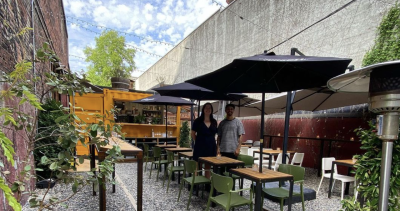Neo-Nativism Versus New Music premieres unheard sounds
Russell Wallace laughs and admits that it’s hard to define neo-nativism—and that it’s no easier now than it was in 1989, when he joined Leonard Fisher and Warren Arcand to produce the landmark fusion of aboriginal music, video, and performance art that introduced the term to the world.
“Leonard did a lot of work on establishing a manifesto that described what all that was,” Wallace recalls in a telephone interview from his Vancouver home. “I don’t remember all the details, but it was to do with using technology and modern means of expression to transmit tradition and music and whatnot. That was my take on it, anyway, although I think all three of us had different definitions of what it was at that time.
“It was a problematic term: we didn’t know how to define what we were doing or what we were looking at, but that was just a way to name it, at that point, for marketing or whatever.”
The amiable musician, filmmaker, and inveterate online punster adds that the title of the neo-nativists’ 25th-anniversary show is also designed to attract attention. Neo-Nativism Versus New Music, it’s called, but the Western Front production is more about cooperation than confrontation.
Wallace, for instance, has teamed up with composer Remy Siu to create music from the tongue-twisting consonants of the Salish language, as sung by the former’s family band, Tzo’kam.
“The original idea was to take Salish consonant sounds and use that as the basis for what we call the Salish beatbox, using those sounds as the basis for rhythms and compositions,” Wallace says. “Basically, a lot of people live in Salish territory but don’t even know a lot of the consonant sounds, or how to make them. So this is one way of blasting the sounds at people and getting them to hear them, hearing the differences.”
Using the Lower Mainland’s original language is a way of reasserting claim to the land, he adds, while stressing that it’s also a way of sharing it with more recent arrivals.
A similar process is at play in the work violinist Pat Ernst will be doing with Taiwanese-born erhu virtuoso Lan Tung.
“Pat grew up in the Yukon, but his background is Gwich’in, which is near Yellowknife—it’s a traditional territory of the people near Yellowknife. So he’s learned some Gwich’in songs, but he’s also part of a number of different groups: he’s with the Whiskeydicks and with Pearl Jig, so he does a lot of Irish and Scottish music, and mariachi is another thing he does.
“I chose Lan Tung because she’s knowledgeable about Chinese music but also new music.…I thought it would be really cool to pair them up, playing string-based interpretations of their traditional music but also looking at new music as a vehicle to carry it. I haven’t heard what they’ve done yet, but they got excited by the process and created two new compositions.”
Also on the Neo-Nativism Versus New Music bill will be performances by Fisher and Arcand, the latter in conjunction with composer Michael Park. To bring the evening to a suitably celebratory and collaborative close, Wallace and guitarist Tony Wilson have convened the Salt Chuck City Ensemble, which features an all-star cast of jazz performers, new-music artists, and First Nations singers.
“We both like [the late saxophonist] Jim Pepper, so, apparently, there’ll be a medley of some of his songs,” Wallace says. “And there’ll be a Link Wray song I asked Tony to work on. It’s called ‘Genocide’, and it’s pretty sparse, but Tony said it was so sparse he could play around with it, so he’ll be doing that. And he’s arranging one of our Tzo’kam songs, ‘Today Is a Good Day’, and also another composition that I did years ago, ‘Indian Arm’. Deanna Gestrin did a version of it a little while back, and she’ll be one of the singers, so I thought it would be a good one for her to do.”
Wallace notes that new music is an even more mutable term than neo-nativism: for some people it means the Third Viennese School of the early 20th century; for others, the latest electronic innovations. One thing’s for sure, though: Neo-Nativism Versus New Music will premiere sounds that have never been heard before, and they’ll likely win a warm welcome.
Neo-Nativism Versus New Music takes place at the Western Front on Saturday (November 15).















Comments